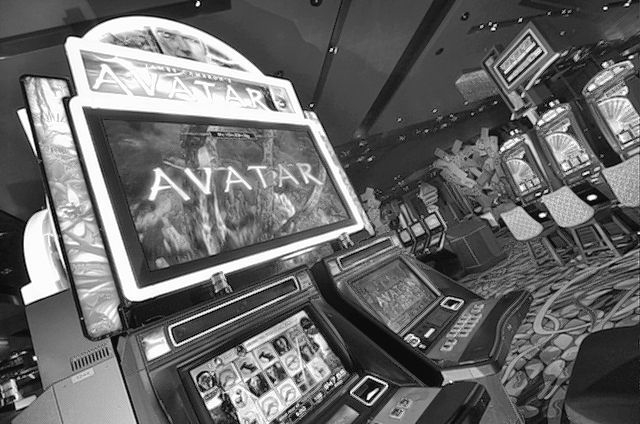INSIDE GAMING: Beware gaming equipment investing

Save for a few small companies, Wall Street has thrown in the towel on slot machine manufacturers for 2014.
Without new hotel-casino openings (other than The Cromwell and SLS Las Vegas) and a slot machine replacement market that analysts term “nonexistent,” the investment community has been advised to view the gaming equipment sector with caution.
Janney Capital Markets gaming analyst Brian McGill came home from this month’s Southern Gaming Summit in Biloxi, Miss., with a sour opinion of the slot machine industry. Few sales were seen at the trade show.
“While we think investors generally realize conditions are difficult given the recent earnings releases, we expect it will get materially worse before it gets better,” McGill said in a note to investors.
Wells Fargo Securities gaming analyst Cameron McKnight said slot machine makers faced a difficult first quarter and don’t expect the trend to change.
During a recent Wells Fargo-sponsored gaming conference, gaming equipment company leaders told investors that casino operators aren’t spending money to replace older games. At best, replacement sales will be flat through the year when compared with 2013.
“The gaming equipment market remains very competitive as smaller entrants are gaining (market) share,” McKnight said.
Most of the analyst community agreed Bally Technologies stands out among its peers.
The company bought rival SHFL entertainment last year in a $1.3 billion acquisition that formed one of the gaming industry’s most diverse manufacturers. Bally also reported decent third-quarter earnings, increasing profits and revenue.
Then, on May 15, Bally suddenly switched CEOs.
Ramesh Srinivasan, who led the company for 17 months and oversaw the SHFL buy, was replaced by his former boss, Richard Haddrill, the company’s CEO from 2004 to 2012.
As one analyst said, “You don’t change CEOs when things are going well.”
However, the consensus was the competitive environment facing slot machine makers vying for a handful of sales opportunities brought about Bally’s leadership change.
Rather than relying on Srinivasan, whose tech background helped grow Bally’s systems division into an industry leader, investors and the board wanted Haddrill in the CEO’s chair. They remember how Haddrill expanded Bally’s footprint and pressured industry leader International Game Technology.
Integrating SHFL into the process is just one challenge.
“We view the upcoming operational tasks as ones that Haddrill has successfully accomplished in his career and that he is well suited to do going forward,” Macquarie Securities gaming analyst Chad Beynon said.
Also, IGT is reeling. Earnings declined 66 percent in the second quarter; it laid off 7 percent of its global workforce; and it lowered its fiscal 2014 guidance.
Sharks smell blood in the water.
“Unfortunately, we expect IGT to lose even more share going forward,” McGill said. “We think the company has a major problem with a lack of content right now.”
That opinion can only help Bally.
Stifel Nicolaus Capital Markets gaming analyst Steven Wieczynski, however, is worried. He said investors might allow overly negative slot machine industry sentiment to cloud Bally’s competitive advantages, which include greater diversity thanks to the SHFL acquisition.
“We cannot stress enough that Bally truly is a different beast than the companies to which it is often compared,” Wieczynski said.
The biggest problem facing slot machine manufacturers is the deteriorating game replacement market.
McGill said the industry expected to replace about 65,000 older slot machines with newer games this year. That figure is likelier to be less than 60,000.
Also, it was thought IGT, Bally and Scientific Games-owned WMS would control as much as 70 percent of the replacement market. McGill now pegs it closer to 50 percent.
Australia-based Aristocrat Technologies and Japan-based Konami Gaming have sliced into the business of the “Big Three” and could account for as much as 30 percent of overall replacements.
“Simply put, there are too many manufacturers competing to sell too few games,” McGill said. “We had seen replacements at close to flat for this year, but are becoming increasingly concerned they actually decline on a year-over-year basis.”
The other factor beginning to weigh on slot makers is that operators want to remove “participation” games — slot machines for which manufacturers and casinos share revenue. That move would also hurt IGT, whose megajackpot games fall under the business model.
McGill said casino operators expressed the desire to reduce dependence on participation games, not just in regional markets but also at Indian casinos.
“IGT is the most leveraged to this segment,” McGill said. “Given the competition in the space and generally disappointing slot results in major markets, we expect the company to lose megajackpot games and replace them with lower-yielding games.”
Still, there’s at least one rising star: Multimedia Games.
The Austin, Texas-based manufacturer with a sales and marketing office in Tivoli Village, has been steadily growing its business through slot machine sales into Nevada, Oklahoma and Washington casinos. Multimedia Games also has other growth potential in Pennsylvania, Illinois, Oregon and Canada that will play out through this year and 2015.
“Multimedia Games is one of the companies that is taking share,” McGill said. “And our checks are positive.”
Howard Stutz’s Inside Gaming column appears Wednesdays and Sundays. He can be reached at hstutz@reviewjournal.com or 702-477-3871. Follow @howardstutz on Twitter.












